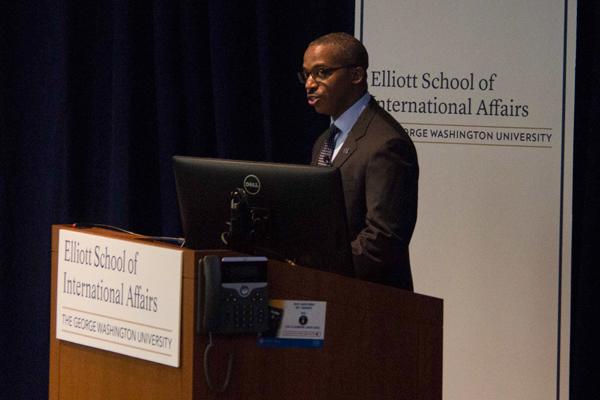Research grants for the Elliott School of International Affairs increased by more than 300 percent since 2012.
Reuben Brigety, the dean of the Elliott School, announced at a speech last month that faculty were awarded more than $11 million in grants last year. Researchers and professors in the international affairs school said the increase in research funding reflects faculty members’ innovation and the school’s increasingly positive reputation.
“Our faculty are the foundation of our programs and they create the groundwork for our educational process,” Brigety said in his speech.
Brigety was hired last year with goals of bringing research and teaching on Africa to the school’s forefront and further raising the status of the high-ranked international affairs school by increasing faculty collaboration.
Hope Harrison, an associate dean for research at the Elliott School and associate professor of history and international affairs, said in an email that 25 grants were issued in fiscal year 2015. She said that faculty have received larger grants, especially from the National Science Foundation, and created partnerships for an International Research and Education grant totaling more than $3 million, a National Nuclear Security Administration grant for $1.7 million and a Department of Defense Minerva grant for $1.6 million.
The increase in the grant amounts is credited to a higher success rate in faculty’s grant applications, Harrison said. She said the school launched a new research website for faculty, started a book series to highlight faculty research, sent out regular announcements about grant applications and worked with faculty to prepare strong grant proposals.
Harrison said the Elliott School faculty’s research helps people understand what is going on around the world and how to work to improve foreign policies, citing faculty’s research on alleviating poverty.
“It is one thing to watch passively what’s going on in the world,” Harrison said. “It is another thing entirely to focus intensely on understanding and analyzing why things happen as they do in the world and then working to spread that knowledge to students, to the policy-making community and to the world beyond Washington.”
Before Brigety, former dean Michael Brown doubled the school’s number of research institutes and hired about 20 new faculty members. Under his tenure, the Elliott School was consistently highly ranked by publications like Foreign Affairs magazine.
The school’s reputation is connected with the faculty’s reputation and the influx of research, Harrison said.
“Faculty who are very research active and thus are very active in publishing the results of their work generally attract students to the school, make for strong and engaged teachers, attract media attention to the school, garner invitations from government officials and NGOs to provide advice and attract funding,” Harrison said.
Research at GW earned an all-time high amount of funding this fall, when researchers received more than $88 million in funding over the past three months – a 135 percent increase from the same time last year. More research staff members have been funneled into individual schools from the Office for Vice Presidential Research to help with administrative duties and work with researchers.
Allison Macfarlane, a professor of public policy and international affairs and director of the Center for International Science and Technology Policy, said an increase in funding doesn’t necessarily translate to an increase in research because some faculty members do research without grant funding.
“Just because there has been an increase in funding doesn’t mean that there has been an increase in research,” Macfarlane said. “There are plenty of academics who do research with no funding.”
Macfarlane came to GW about two years ago with a goal of encouraging interdisciplinary nuclear and energy research. The center recently hired a faculty member who works on climate change and renewable energy, she said.
Macfarlane received funding from the MacArthur Foundation and the National Nuclear Security Administration for her research on nuclear policies, in which she is finding solutions to nuclear waste disposal and preventing the proliferation of nuclear weapons, she said.
“Academic research is important, period. We always need to be expanding our knowledge and understanding our world better and we do that in part by academic research,” Macfarlane said.
Henry Hale, a professor of political science and international affairs and the co-director of the program on new approaches to research and security in Eurasia, said recently hired faculty members have been active in raising research money.
“Several people who arrived in recent years, who have been really active, have been able to raise a lot of money for research,” Hale said. “The Elliott School and OVPR have made it a priority to raise research money.”
Susan Aaronson, a research professor of international affairs and a cross-disciplinary fellow, said that research in international affairs is important because that research can inform international policy.
“What I think the Elliott School is particularly good at is getting funded to do research that is scholarly but can inform public policy,” Aaronson said.







